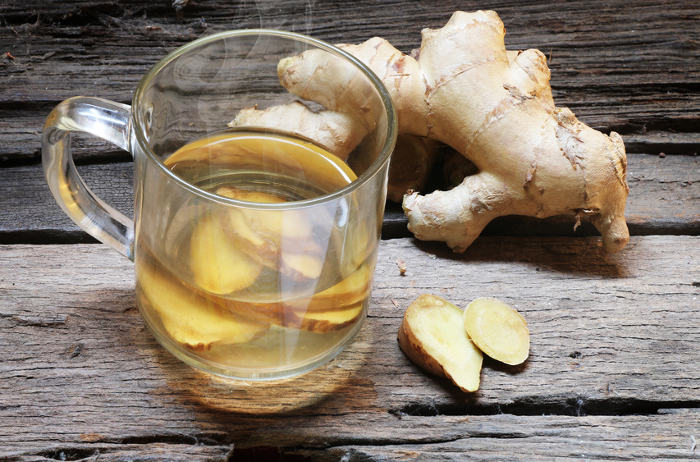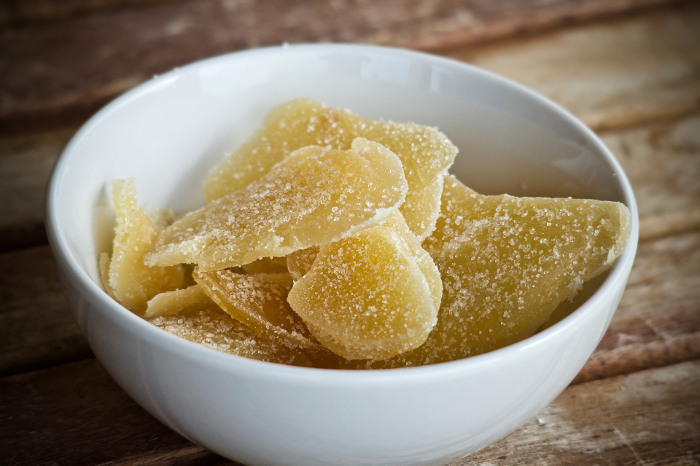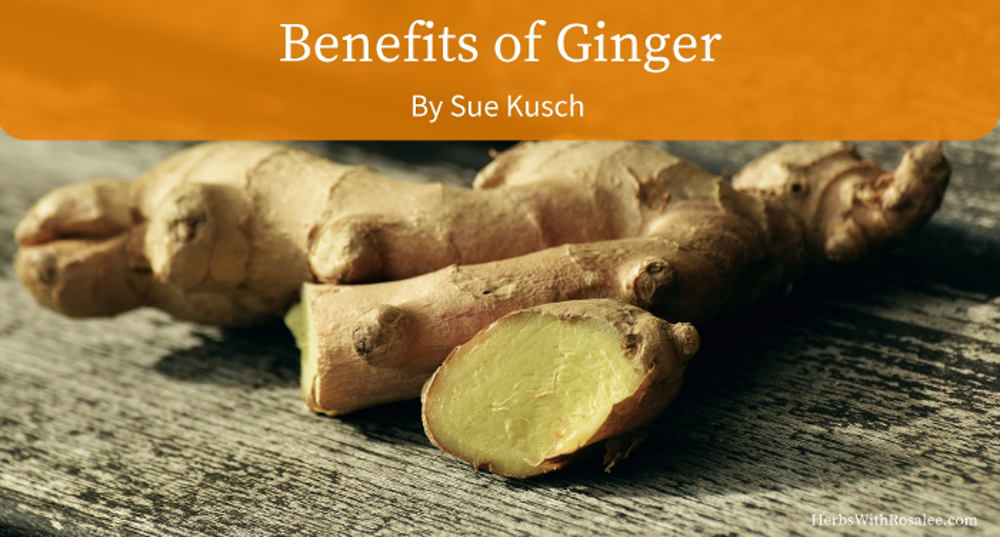Get weekly tips, recipes, and my Herbal Jumpstart e-course! Sign up for free today.

Ginger Health Benefits
By Sue Kusch
Share this! |
|
When the weather turns cooler and the leaves start falling in my northern region, I can’t help but think about recipes that include cinnamon, nutmeg and ginger's health benefits as warming spices. Of course, there is some irony in that statement: spices that are traditional to our autumn and winter celebrations grow in warm and sunny subtropical and tropical regions!
Ginger Health Benefits as a Warming Spice
If I had to choose a favorite warming spice, it would be ginger. Its differing tastes, its versatility in the kitchen and its diverse medicinal uses make it one of the most used herbs in my home. And I am not alone; billions of people in Asian cultures use ginger as a common flavoring in their meals and as an herbal remedy for a variety of complaints.
Growing up in the northern midwest, my experience with ginger was limited to the winter holidays and baked goods. In mid-November, my mom would dig around her spice shelf and pull out a small half-empty plastic jar of ground dehydrated ginger from the previous year (or longer), add the required amounts to pumpkin pie and gingerbread cookies and then place it back in the cabinet for next year’s use. I have discovered ground spices that were over ten years old in my mother’s spice cabinet!
In my home, I keep a supply of dried ground ginger, dried chopped ginger (ideal for ginger tea) and fresh ginger and use ginger almost daily for a wide variety of culinary and medicinal uses.
For the last two decades, I have used fresh ginger in the kitchen as part of the Chinese cooking trinity of garlic, ginger and scallions and the East Indian trinity of garlic, ginger and turmeric. And like my mom, I use ginger in seasonal baked goods. Because of its digestive support properties, I add freshly grated ginger to just about every recipe: soups, steamed vegetables, seafood and meat.
Ginger Tea Benefits
But it’s only in the last decade that I have come to appreciate the medicinal benefits of ginger. When I first began to explore medicinal plants, I remember feeling completely overwhelmed by the sheer number of healing herbs, so I focused on the herbs and spices that I was already using. I started with ginger tea.
Dehydrated ginger has a spicy hot energy while fresh ginger offers a warming energy, and I like the combined taste of both dried and fresh when making a ginger herbal tea.
During the winter months, I try to get outside each day but the effects of rain, snow and freezing temperatures can chill me to the bones sometimes. I make a strong ginger tea of a few fresh ginger slices and one teaspoon of dried chopped ginger when I am cold after being outside or feeling the initial shivers of a viral infection. I can feel ginger’s warming action move through my body.
Congestion is a miserable experience, especially when you still have to function at some level. Ginger’s stimulating action is effective at getting the mucus flowing and, when I am cold, congested and cranky from an upper respiratory virus, ginger tea with lemon is my go-to remedy.

Bring Ginger Health Benefits to Your Travel First-Aid Kit
Ginger is so versatile medicinally that I keep a tin of powdered ginger in my travel first-aid kit. A strong dose of ginger tea can soothe upset digestion, bloating and diarrhea.
Probably, the most well known of ginger health benefits is for nausea: candied ginger is my delicious remedy for my occasional motion sickness (which occurs only when I insist on trying to read while riding in a car) and research shows that ginger is one of the best remedies for nausea related to early pregnancy, surgery recovery and chemo-drug therapy.
A travel first-aid kit is only useful when you actually remember to bring it with you! This past summer, I was hiking along an uneven trail when one of my feet fell into a hole and twisted onto its side. By the time I hobbled my way back to where I was staying, I had a large bruise developing on my lower calf and a severely swollen ankle. And I realized I had nothing but ice to help with my painful sprained ankle. If I had the dried ginger in my first-aid kit, I could have made a ginger fomentation (a washcloth that is soaked in a herbal tea), applying it to the bruised and inflamed area. A ginger fomentation would have stimulated my circulation and relieved some of the pain.
 candied ginger
candied gingerGinger Health Benefits in the Kitchen
But for me the best of ginger's health benefits is its uses in the kitchen. Last year, I made my first ginger syrup and it is now a staple in my fridge. I use it to sweeten tea (especially good with chai), I add an ounce or two to a glass of sparkling water and use it for Moscow Mule cocktails (instead of ginger beer).
A tablespoon of ginger syrup in a stir-fry sauce? Delicious!
Ginger Syrup Recipe (From Herbal Roots Zine)
Ingredients:
- 2 cups sliced ginger root
- 2 cups water
- 1 1/2 cups honey
Directions:
Place ginger roots and water in a saucepan and heat to a boil.
Simmer for 10 minutes then cover and let sit for one hour.
Strain off liquid from roots (roots may be frozen and used again).
Add honey to the saucepan and heat gently while stirring to incorporate honey then shut off heat. Do not boil.
Pour into a jar and label. Store in the refrigerator for up to a month.

Sue Kusch, a former community college instructor and academic advisor, incorporates her experiential wisdom, expertise and science-based research garnered from her three decades of growing vegetables, fruit and herbs into her educational writing about plants and how people use them. In addition to her BA in Social Sciences and Masters in Education, she completed the Master Gardener training in 2011 and two permaculture courses in 2001 and 2014. She has studied medicinal and nutritional uses of herbs, including studies at Herbmentor and East West School of Planetary Herbology, since 1997. An avid reader, lover of historical and folkloric information, and a promising storyteller, Sue writes about the intersection of plants and people.
